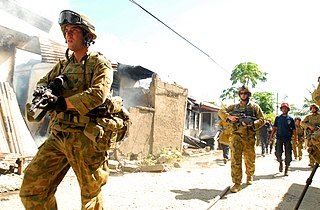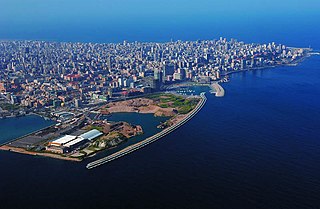
The Howard Government supported the disarmament of Iraq during the Iraq disarmament crisis. Australia later provided one of the four most substantial combat force contingents during the 2003 invasion of Iraq, under the operational codename Operation Falconer. Part of its contingent were among the first forces to enter Iraq after the official "execute" order. The initial Australian force consisted of three Royal Australian Navy ships, a 500-strong special forces task group, two AP-3C Orion maritime patrol aircraft, two B707 Air-to-Air refuelling aircraft, C-130 Hercules transport aircraft and No. 75 Squadron RAAF. Combat forces committed to Operation Falconer for the 2003 Invasion were withdrawn during 2003. Under the name Operation Catalyst, Australian combat troops were redeployed to Iraq in 2005, however, and assumed responsibility for supporting Iraqi security forces in one of Iraq's southern provinces. These troops began withdrawing from Iraq on 1 June 2008 and were completely withdrawn by 28 July 2009.
The Airfield Defence Guard (ADG) mustering of the Royal Australian Air Force (RAAF) performs specialist ground defence tasks to protect air power assets from hostile ground action. The mustering is composed of non-commissioned members, commonly called 'ADGies,' most of whom are employed within a Security Forces (SECFOR) Squadron (SQN). Their primary role is the protection of RAAF equipment, personnel, assets and facilities during operations. While ADGs train to counter special forces as the primary ground threat to the projection of air power, ADGs are themselves conventional forces. Other duties include training RAAF personnel in weapon handling and basic ground defence tactics.

The Irish Army, known simply as the Army, is the land component of the Defence Forces of Ireland. As of May 2016, approximately 7,300 men and women serve in the Irish Army on a permanent basis and 1,600 active Reservists, divided into two geographically organised brigades. As well as maintaining its primary roles of defending the State and internal security within the State, since 1958 the Army has had a continuous presence in peacekeeping missions around the world. The Army also participates in the European Union Battlegroups. The Air Corps and Naval Service support the Army in carrying out its roles.

The Australian contribution to the war in Afghanistan has been known as Operation Slipper and Operation Highroad.

Royal Air Force Akrotiri or more simply RAF Akrotiri is a large Royal Air Force station, on the Mediterranean island of Cyprus. It is located in the Western Sovereign Base Area, one of two areas which comprise Akrotiri and Dhekelia, a British Overseas Territory, administered as a Sovereign Base Area.
Law enforcement in Australia is one of the three major components of the country's justice system, along with courts and corrections. There are law enforcement officers employed by all three levels of government – federal, state / territory, and local.

The United Nations Peacekeeping Force in Cyprus (UNFICYP) is a United Nations peacekeeping force that was established under United Nations Security Council Resolution 186 in 1964 to prevent a recurrence of fighting following intercommunal violence between the Greek Cypriots and Turkish Cypriots, to contribute to the maintenance and restoration of law and order and to facilitate a return to normal conditions. The current force commander is Major General Mohammad Humayun Kabir (Bangladesh), (UNFICYP) Force Commander of United Nations Peacekeeping Force in Cyprus.
The Australian Protective Service (APS) was an Australian Commonwealth law enforcement agency which existed between 1984 and 2004. The APS was created by the separation of the Protective Service component of the Australian Federal Police (AFP) into a new agency based upon recommendations contained in the Stewart Royal Commission of Inquiry into Drug Trafficking. It was initially responsible for protecting personnel and property of the Australian government; foreign diplomatic missions and Internationally Protected Persons (IPPs); and the provision of custodial services at immigration detention centres. From 1990 the APS commenced providing Counter Terrorist First Response duties at certain security-designated airports including the specialist Bomb Appraisal Officer function and, following the terrorist attacks of 11 September 2001, deployed Air Security Officers on board Australian registered commercial aircraft. Close Personal Protection (CPP), or bodyguard, functions were never provided by the APS; where this has been a Commonwealth responsibility, the function is provided by the AFP.

Australia was a member of the international coalition which contributed military forces to the 1991 Gulf War, also known as Operation Desert Storm. More than 1800 ADF personnel were deployed to the Persian Gulf from August 1990 to September 1991. In August 1990, two frigates HMAS Adelaide and HMAS Darwin and the replenishment ship HMAS Success left for the Persian Gulf. HMAS Success had no air defences so the Army 16th Air Defence Regiment deployed on this ship. On 3 December 1990, HMAS Brisbane and HMAS Sydney (IV) relieved HMAS Adelaide and HMAS Darwin. On 26 January 1991, HMAS Westralia replaced HMAS Success. A Navy Clearance diving team was also deployed for explosive ordnance and demolition tasks. Australian ships were in danger of mines and possible air attacks. In a number of recorded incidents, HMAS Brisbane encountered free floating mines, on one occasion narrowly avoiding a collision. Both HMA Ships Brisbane and Sydney encountered significant air threat warnings from Iran and Iraq throughout the initial period of the commencement of the Desert Storm Campaign. The detection of land based silkworm missiles from Iran throughout the campaign also added to the challenges for both crews as well as the multi-national Naval Forces.

Operation Astute was an Australian-led military deployment to East Timor to quell unrest and return stability in the 2006 East Timor crisis. It was headed by Brigadier Bill Sowry, and commenced on 25 May 2006 under the command of Brigadier Michael Slater. The operation was established at the request of East Timor's government, and continues under an understanding reached between Australia, East Timor, and the United Nations, with the United Nations Integrated Mission in East Timor supporting and helping to develop East Timor's police force. Other countries deploying soldiers to East Timor include Malaysia, New Zealand and East Timor's former colonial power Portugal, operating under independent command.
Humanitarian aid during the 2006 Lebanon War refers to international efforts for civilian assistance during the 2006 Lebanon War.

Operation Morris Dance was an Australian military operation conducted in May 1987 in response to the first of the 1987 Fijian coups d'état.

The Australian Defence Organisation is an Australian Government organisation that consists of both the Australian Defence Force (ADF) and the civilian Department of Defence personnel supporting the ADF.
The 1st Close Health Battalion (1CHB) is a unit of the 17th Combat Service Support Brigade of the Australian Army. It is headquartered at the Robertson Army Barracks in Darwin, but has sub-units located in Darwin, Townsville and Brisbane. The unit traces its lineage back to the 1st Field Hospital, which was raised in the 1960s for service as part of Australia's contribution to the Vietnam War. Since then, the unit has changed names twice and personnel have been deployed on numerous peacekeeping and warlike operations throughout Africa, the Middle East and the Asia-Pacific region.
The Australian Defence Force Investigative Service (ADFIS) is the body responsible for complex and major investigations involving the Australian Defence Force. The ADFIS conducts investigations of serious incidents and breaches of the Defence Force Discipline Act involving persons subject to DFDA jurisdiction. The ADFIS is a 'tri-service' unit and is manned by 150 members of the Royal Australian Navy, Australian Army and Royal Australian Air Force. It was established in 2007 and is headquartered in Canberra.

The Australian Operational Service Medal is a campaign medal established on 22 May 2012 to recognise service by Australian Defence Force (ADF) personnel on designated hazardous operations. It may also be awarded to civilians who serve alongside the ADF on designated operations under specific conditions.
The Chief of Joint Capabilities (CJC) is the head of the Joint Capabilities Group (JCG) in the Australian Department of Defence, part of the Australian Defence Organisation. This position was created on 1 July 2017. The current chief is Air Marshal Warren McDonald.
The Joint Health Command (JHC) is led by the dual-hatted Commander Joint Health and Surgeon General of the Australian Defence Force and is responsible for the delivery of military medicine and joint healthcare services to Australian Defence Force personnel, including military psychiatry and rehabilitation services. The JHC is also responsible for providing strategic health policy, the development of the health preparedness of ADF personnel for operations, and the coordination of health units for deployment in support of operations.















